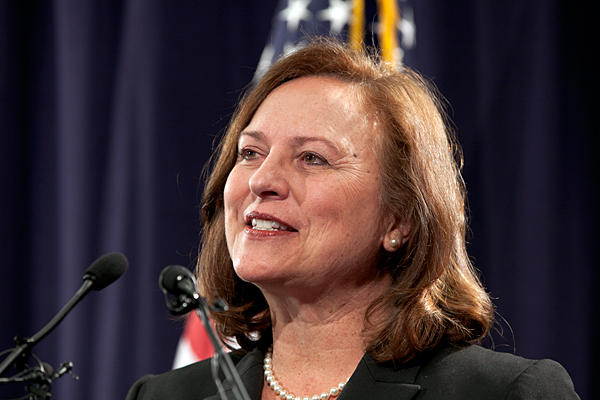US Senate Candidate Deb Fischer Runs Strong in Nebraska

One of the recurring themes in the aftermath of the Todd Akin debacle is that it may cost Republicans control of the U.S. Senate where they currently hold 47 seats, needing a net gain of four seats to win a majority.
It is well known that vulnerable incumbent Claire McCaskill spent millions to push for Todd Akin believing he would be the easiest to defeat. Whether it was Missouri's Republican primary voters or Democrats crossing over to vote in the open primary to get the gaffe-prone Republican, that is what they got.
Should Akin lose in November surely one of the causes of death will likely be that Missouri nominated a candidate who was "too conservative" and therefore unelectable.
This was much the feeling when Sharron Angle and Christine O'Donnell lost winnable seats in 2010. Many thought they lost because they were too conservative when they were really underwhelming candidates who were also gaffe-ridden.
Also consider Indiana. In May, state treasurer Richard Mourdock defeated six-term incumbent Richard Lugar. A safe Republican seat since Lugar's first victory in 1976, Indiana is now open and Democratic super-PACs have launched an ad blitz assailing Mourdock's stance on the constitutionality of Medicare.
Most recent polls show Mourdock with a consistent, but slim two-point lead over U.S. Representative Joe Donnelly. Should Mourdock lose it would be a net loss of a seat Republicans otherwise would have held as well as raising questions about the wisdom of nominating the more outwardly conservative candidate.
With the Republican plan to re-take the U.S. Senate looking rocky there is at least one, and right now it is the only state where Republicans, barring an unforeseen scandal, will gain a seat currently held by a Democrat: in Nebraska with state senator and US Senate candidate Deb Fischer.
Fischer won the Republican primary in a three-way race. Favored over her were Attorney General Jon Bruning and state treasurer Don Stenberg. Bruning enjoyed establishment support, but was dogged by allegations that he enriched himself through his office. Stenberg had the endorsements of Senators Jim DeMint and Rand Paul, yet he had already lost three previous Senate races.
But it was Fischer who surged late through her support for Grover Norquist's "No Tax Pledge" and the "Repeal Pledge," a "comprehensive promise to repeal, push back, defund and dismantle" the Affordable Care Act on top of an endorsement from Sarah Palin.
From the north-central town of Valentine, Nebraska, Fischer married a rancher and ran a family ranch corporation. First elected as a state senator in 2004 she is being term-limited out of office.
In the Nebraska state legislature, the nation's only unicameral body, Fischer was described as "formidable," logging over 30,000 miles a year on the road to visit constituents in her rural district.
Of her tenacity, a Democratic colleague said Fischer, "would not compromise until she was fully convinced she didn't have the votes to get what she wanted." According to the Omaha World-Herald, Fischer's biggest legislative accomplishment was the diversion of one quarter cent of the state's sales tax revenues into road projects.
On the campaign trail, Fischer has defined herself as a conservative and disciplined her message by focusing on the economy and repealing the new health care law as well as relying on conservative red meat such as the Second Amendment and curtailing illegal immigration.
Fischer has not spoken much on foreign policy and national security, but has mostly stuck to platitudes. Her campaign website implies that she is mildly hawkish, promising to:
"Give our military the tools they need to keep America safe and free . . ."America cannot allow nuclear arms to get in the hands of terrorist states or allow rogue nations to threaten or bully others with nuclear threats. That is why we must fight - and win - the war on terrorism. To succeed in this mission, fighting terrorism needs to be the top priority of the federal government, not an afterthought."
Democrats, in a difficult position following the retirement of Ben Nelson, have nominated former governor, senator, presidential candidate, and Vietnam War veteran Bob Kerrey, one of the only remaining "big name" Democrats in the state. But Kerrey hasn't held office in almost twelve years and has spent the intervening time in New York as the president of The New School.
In a move that no doubt is a reaction to the Akin fiasco, it was announced this week that Fischer will speak at this month's Republican National Convention. While the GOP will likely desire showcasing its women to offset the image that the party is "anti-woman," it speaks to Fischer's strength as a candidate that a state senator from a rural part of an agricultural state is placed on a big stage when there are already numerous high-profile Republican women and office-holders.
Short of an unexpected disaster, US Senate candidate Deb Fischer is lining up to become a significant player. If the fall-out from Todd Akin costs Republicans not only a winnable seat in Missouri, but control of the entire Senate, there may be a push by Democrats to continue supporting the more vulnerable and often more conservative candidates, assuming they will be easier to beat.
Nebraska may be an outlier-- it has only voted Democratic in one presidential election since 1940-- so it may not be the perfect case study. But Fischer is not Sharron Angle nor Christine O'Donnell. Neither is she facing an incompetent challenger and most polls show her leading by double-digits.
Clearly conservative in her politics and possessing a will to work for her agenda, Fischer is someone who is neither prone to gaffes nor easily marginalized. At 61, she is not the new face of the Republican Party, yet she is a political force and just what the Republicans need to step closer to their goal of retaking the Senate.




